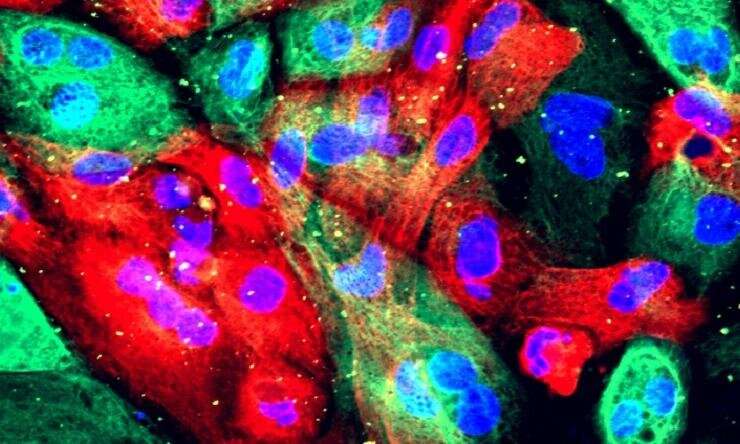New breakthrough reveals how prostate cancer may begin

Researchers at the University of East Anglia have made an important discovery about how prostate cancer may start to develop. A new study published today in Molecular Oncology reveals that the prostate as a whole, including cells that appear normal, is different in men with prostate cancer. It suggests that tissue cells throughout the whole prostate are primed and ready to develop prostate cancer.
This means that it may be better to treat the whole prostate rather than only the areas in the prostate that have cancer. The team hope their work could help scientists better understand the causes of prostate cancer, and even prevent it altogether.
Lead researcher Prof Daniel Brewer, from UEA's Norwich Medical School, said, "Prostate cancer is the most common cancer in men and kills one man every 45 minutes in the UK.
"Often, when men are diagnosed with prostate cancer, groups of cancer cells can be found in more than one location within the prostate. We wanted to know if this is because of changes in 'normal' prostate cells throughout the prostate."
Cancer is driven by changes in DNA, the genetic code of life, that appear in every cell. The team studied the DNA code in 121 tissue samples from 37 men with and without prostate cancer.
Prof Brewer said, "The samples we studied included tissue that comes from the cancer and tissue from elsewhere in the prostate, which looks normal down the microscope.
"This produces a massive amount of data and by applying a large amount of computer power we can determine the differences that have occurred in the DNA, giving us insight into how the cancer grows. We found that 'normal' prostate cells in men who had prostate cancer had more mutations (changes in the DNA) than 'normal' prostate cells from men without prostate cancer.
"Based on the genetics of the samples analyzed, we created maps to understand where the different mutations occurred. And we showed that in most men, the mutations in normal cells are different to mutations in cancer cells.
"The 'normal' prostate cells in men who have prostate cancer appear to provide a beneficial environment for prostate cancer cells to develop and grow. In other words, the whole prostate is primed and ready to develop prostate cancer driven by an as-yet unknown, biological process.
"This work has improved our knowledge of how prostate cancer first starts to develop and might one day give us clues as to how to prevent or treat it. And it shows that it may be better to treat the whole prostate rather than only the areas in the prostate that have cancer," he added.
Dr. Hayley Luxton, Senior Research Impact Manager at Prostate Cancer UK, said, "This exciting new research shows for the first time how normal cells in the prostate can facilitate the growth and spread of prostate cancer.
"The researchers found that normal prostate cells in men with prostate cancer have specific genetic changes that make them act like a rich compost, providing the perfect environment for prostate cancer cells to grow and develop. These findings give us important new insights into the early development of prostate cancer, which might one day give us clues as to how to prevent it."
More information: The architecture of clonal expansions in morphologically normal tissue from cancerous and non-cancerous prostates, Molecular Oncology (2022). DOI: 10.1186/s12943-022-01644-3


















